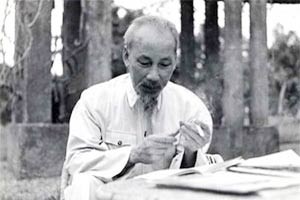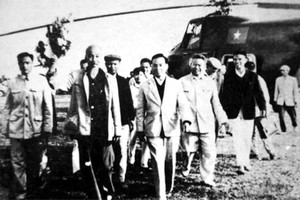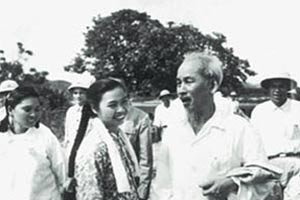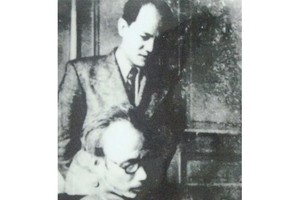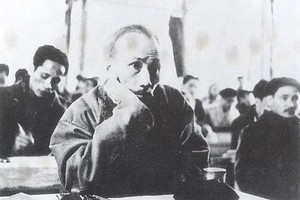1942
Ho Chi Minh was jailed in Liuzhou, China, and he began to compose poems in Chinese describing life in prison. One of his first poems was “Four months has passed,” which was later translated into Vietnamese.

It reads:
“One day in prison is as long as thousands of years at large”
This saying was true to me
Sufferings in jail for just four months
Are equal to ten years’ hardship in normal life
Four months with hunger
Four months with lack of sleep
Four months with unchanged clothes
One of my teeth fell out
My hair has turned gray
I have become as raw-boned as a starved man
With scabies all over my body
Despite all this, I am still patient
Life in prison is very miserable
But my morale remains strong
1945
Speaking at a Government Council meeting held to discuss preparations for a general elections, President Ho Chi Minh asked: “What will we do to have the elections held properly in communes and villages?” and “What instructions have been given to voters?” and “What measures will we take to call on all people to go to the polls?”
1951
In writing back to an army unit that reported their military victories, the President said: “You should hold fast to your determination to defeat the enemy. You should get close to the public and help them. Do not be complacent or underestimate our enemy. We should treat prisoners of war, French and Vietnamese alike, kindly and try to persuade them to follow us. I hope to hear more news of victories from you.”
In a letter to painters at the 1951 Paintings Exhibition, he said: “Culture and art can be seen as a front in our resistance war and all of you are soldiers on that front. Like combatants in battlefields, you are serving our resistance war, our Fatherland and our people …
“Cultural and art activities need to be strengthened, and to strengthen them, you should practice criticism and self-criticism. Someone can say that I want to politicize cultural and art activities. That is right. Like other activities, culture and art must be for the sake of our political and economic goals.
“The future of our nation is very promising and so is that of culture and art. I wish you good health, progress and success.”
1954
Attending a Politburo meeting to discuss a plan for post-war economic recovery, the President said: “In the past resistance war, our strength was mainly sourced from rural, not urban, areas … It may be wrong to industrialize too hastily. Measures to step up agricultural production must be included in our plans.”
1963
Speaking at a Politburo meeting on the political situation in the South after the Ngo Dinh Diem administration was overthrown, the President said: “Though we now have some advantages, we must overcome some difficulties, including those in mass mobilization. We should launch a campaign to call on Vietnamese not to fight each other.
“People, soldiers, and Party members in the South are very brave. If all of us unite and be determined, we can win the war, even if the US army is 10 times stronger than it is now.”
By Duong Trung Quoc* and his assistants
*The author is a historian and member of the National Assembly
